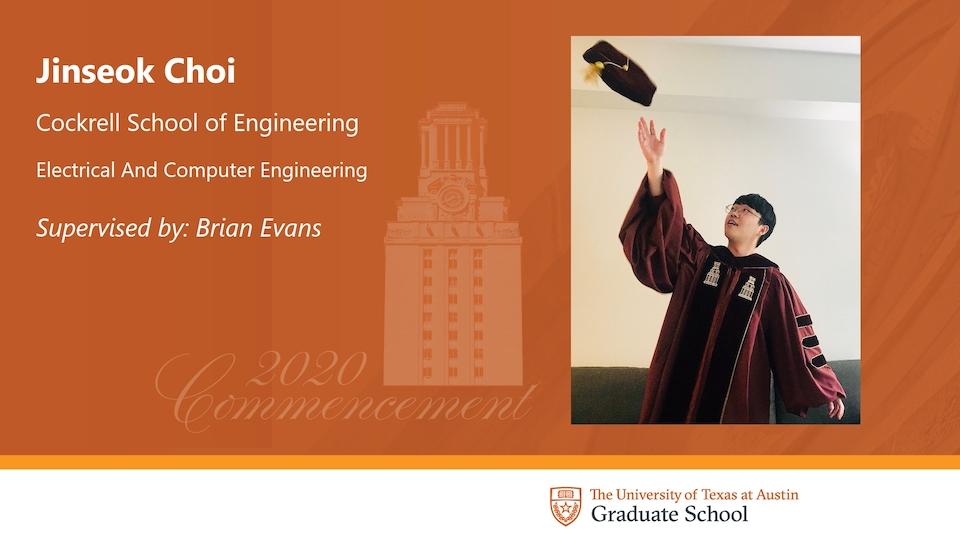
Dr. Jinseok Choi receiving his PhD degree at the Spring 2020 graduation ceremony
For more information contact: Jinseok Choi <jinseokchoi89@gmail.com>
This dissertation will be presented to the Faculty of the Graduate School of The University of Texas at Austin in partial fulfillment of the requirements for the degree of Ph.D. in Electrical Engineering
Abstract
Optimizing Communication Performance of Low-Resolution ADC Systems with Hybrid Beamforming
Jinseok Choi, Ph.D.E.E.
The University of Texas at Austin, December 2019
Supervisor:
Prof.
Brian L. Evans
Dissertation - Defense Slides (PDF) - Defense Slides (PowerPoint)
Contributions in Excel and PDF formats
ESPL Multianntenna Communications Research
Embedded Signal Processing Laboratory - Wireless Networking and Communications Group
Low-resolution analog-to-digital converter (ADC) systems and hybrid analog-and-digital beamforming systems have drawn extensive attention as a promising receiver architecture for millimeter wave (mmWave) communications by reducing hardware cost and power consumption. In this dissertation, hybrid beamforming systems that employ low-resolution ADCs are considered to achieve a better trade-off between communication performance and power consumption. Due to non-negligible quantization errors, however, existing state-of-the-art hybrid beamforming techniques cannot be directly applied to such systems as they ignore the impact of the quantization error. In this regard, I propose new receiver architectures and algorithms for hybrid beamforming with low-resolution ADC systems to enhance spectral efficiency under coarse quantization in different layers of the network stack, and provide subsequent analyses.First, problems of optimizing the number of ADC bits and designing analog combiners with fixed-resolution ADCs are tackled to design an energy-efficient receiver architecture with phase shifter-based hybrid beamforming. A hybrid receiver architecture with resolution-adaptive ADCs for mmWave communications is proposed to optimize the power distribution over ADCs. For the proposed architecture, a near-optimal bit-allocation solution is derived in closed form. In addition, the performance lower bound of the proposed receiver architecture is derived in ergodic rate. For a fixed-resolution ADC system, a new analog combining architecture is proposed for mmWave communications. The proposed analog combiner consists of two consecutive analog combiners that maximize channel gain and minimize quantization error. An approximated ergodic rate of the proposed receiver is also derived in closed form. Next, considering switch-based analog beamforming, an antenna selection at a base station is investigated for low-resolution ADC systems. Unlike downlink transmit antenna selection problems, a quantization-aware antenna selection criterion is necessary and derived to incorporate quantization error for uplink receive antenna selection problems. Leveraging the criterion, a quantization-aware antenna selection algorithm is proposed and analyzed for uplink. Last, in a higher layer of the network stack, a user scheduling problem is investigated for hybrid beamforming systems with low-resolution ADCs. New user scheduling criteria are derived to maximize scheduling gain under coarse quantization and efficient scheduling algorithms are proposed accordingly. Subsequent analysis for the proposed algorithm provides closed-form ergodic rates.

Dr. Jinseok Choi receiving his PhD degree at the Spring 2020 graduation ceremony
For more information contact: Jinseok Choi <jinseokchoi89@gmail.com>